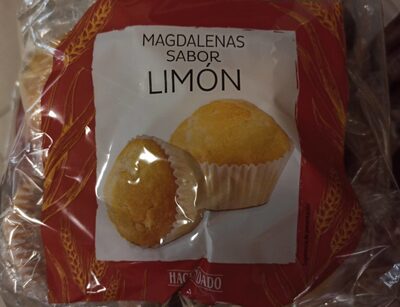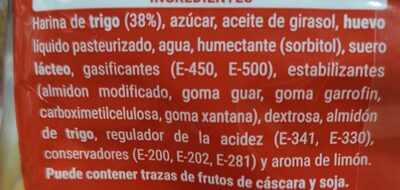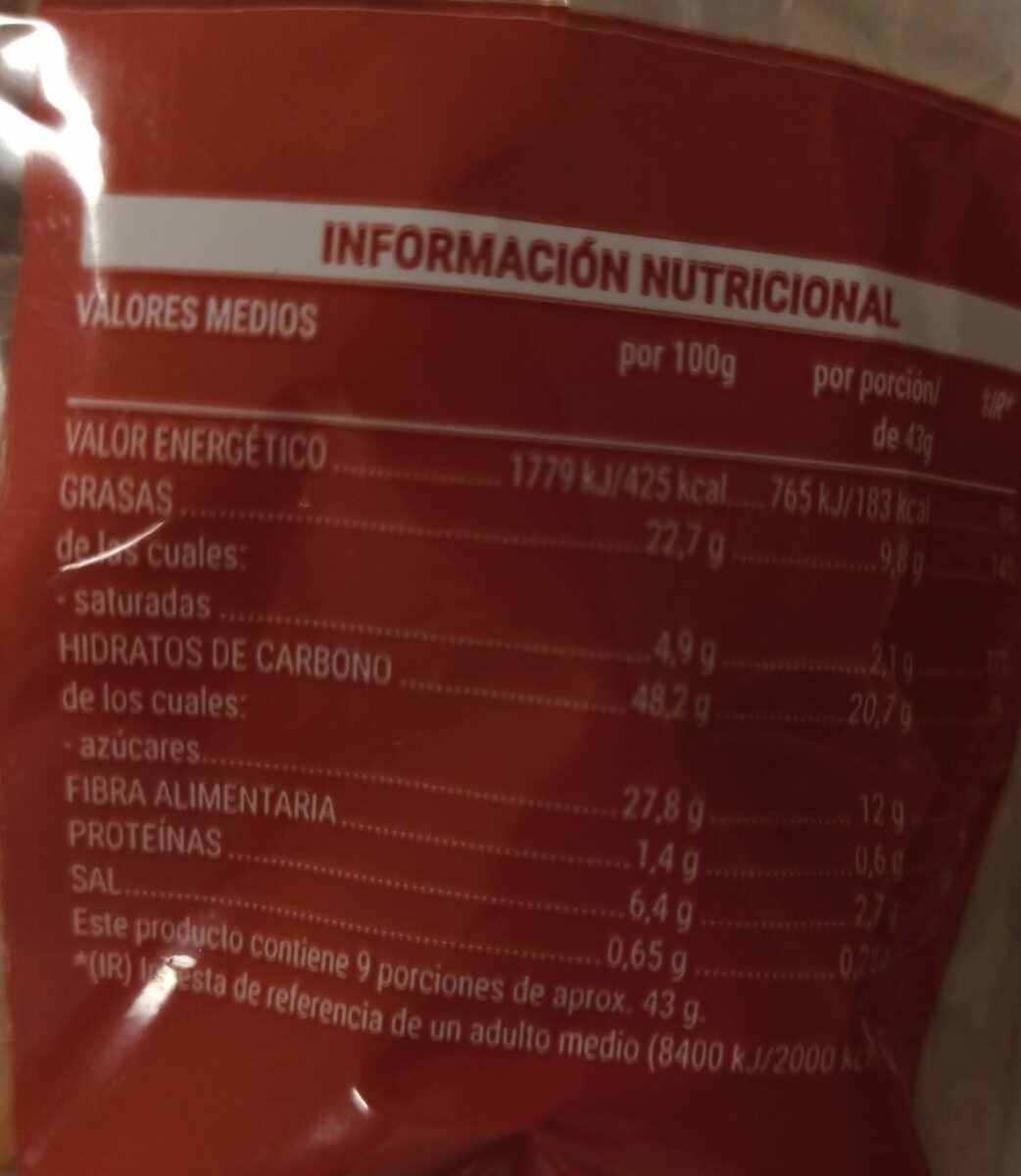Help us make food transparency the norm!
As a non-profit organization, we depend on your donations to continue informing consumers around the world about what they eat.
The food revolution starts with you!
Magdalenas sabor limón - Hacendado
Magdalenas sabor limón - Hacendado
This product page is not complete. You can help to complete it by editing it and adding more data from the photos we have, or by taking more photos using the app for Android or iPhone/iPad. Thank you!
×
Barcode: 8480000159021 (EAN / EAN-13)
Brands: Hacendado
Categories: Snacks, Sweet snacks, Biscuits and cakes, Cakes, Madeleines
Countries where sold: Spain
Matching with your preferences
Health
Ingredients
-
27 ingredients
: Harina de trigo (38%), azúcar, aceite de girasol, huevo líquido pasteurizado, agua, humectante (sorbitol), suero lácteo, gasificantes (E-450, E-500), estabilizantes (almidon modificado, goma guar, goma garrofin, carboximetilcelulosa, goma xantana), dextrosa, almidón de trigo, regulador de la acidez (E-341, E-330), conservadores (E-200, E-202, E-281) y aroma de limón. Puede contener trazas de frutos de cáscara y soja.Allergens: GlutenTraces: Nuts, Soybeans
Food processing
-
Ultra processed foods
Elements that indicate the product is in the 4 - Ultra processed food and drink products group:
- Additive: E14XX - Modified Starch
- Additive: E410 - Locust bean gum
- Additive: E412 - Guar gum
- Additive: E415 - Xanthan gum
- Additive: E420 - Sorbitol
- Additive: E450 - Diphosphates
- Additive: E466 - Sodium carboxy methyl cellulose
- Ingredient: Dextrose
- Ingredient: Flavouring
- Ingredient: Glucose
- Ingredient: Humectant
- Ingredient: Whey
Food products are classified into 4 groups according to their degree of processing:
- Unprocessed or minimally processed foods
- Processed culinary ingredients
- Processed foods
- Ultra processed foods
The determination of the group is based on the category of the product and on the ingredients it contains.
Additives
-
E200 - Sorbic acid
Sorbic acid: Sorbic acid, or 2‚4-hexadienoic acid, is a natural organic compound used as a food preservative. It has the chemical formula CH3-CH-4CO2H. It is a colourless solid that is slightly soluble in water and sublimes readily. It was first isolated from the unripe berries of the Sorbus aucuparia -rowan tree-, hence its name.Source: Wikipedia
-
E202 - Potassium sorbate
Potassium sorbate (E202) is a synthetic food preservative commonly used to extend the shelf life of various food products.
It works by inhibiting the growth of molds, yeast, and some bacteria, preventing spoilage. When added to foods, it helps maintain their freshness and quality.
Some studies have shown that when combined with nitrites, potassium sorbate have genotoxic activity in vitro. However, potassium sorbate is generally recognized as safe (GRAS) by regulatory authorities.
-
E281 - Sodium propionate
Sodium propionate: Sodium propanoate or sodium propionate is the sodium salt of propionic acid which has the chemical formula Na-C2H5COO-. This white crystalline solid is deliquescent in moist air.Source: Wikipedia
-
E330 - Citric acid
Citric acid is a natural organic acid found in citrus fruits such as lemons, oranges, and limes.
It is widely used in the food industry as a flavor enhancer, acidulant, and preservative due to its tart and refreshing taste.
Citric acid is safe for consumption when used in moderation and is considered a generally recognized as safe (GRAS) food additive by regulatory agencies worldwide.
-
E341 - Calcium phosphates
Calcium phosphate: Calcium phosphate is a family of materials and minerals containing calcium ions -Ca2+- together with inorganic phosphate anions. Some so-called calcium phosphates contain oxide and hydroxide as well. They are white solids of nutritious value.Source: Wikipedia
-
E410 - Locust bean gum
Locust bean gum: Locust bean gum -LBG, also known as carob gum, carob bean gum, carobin, E410- is a thickening agent and a gelling agent used in food technology.Source: Wikipedia
-
E412 - Guar gum
Guar gum (E412) is a natural food additive derived from guar beans.
This white, odorless powder is valued for its remarkable thickening and stabilizing properties, making it a common ingredient in various food products, including sauces, dressings, and ice creams.
When used in moderation, guar gum is considered safe for consumption, with no known adverse health effects.
-
E415 - Xanthan gum
Xanthan gum (E415) is a natural polysaccharide derived from fermented sugars, often used in the food industry as a thickening and stabilizing agent.
This versatile food additive enhances texture and prevents ingredient separation in a wide range of products, including salad dressings, sauces, and gluten-free baked goods.
It is considered safe for consumption even at high intake amounts.
-
E420 - Sorbitol
Sorbitol: Sorbitol --, less commonly known as glucitol --, is a sugar alcohol with a sweet taste which the human body metabolizes slowly. It can be obtained by reduction of glucose, which changes the aldehyde group to a hydroxyl group. Most sorbitol is made from corn syrup, but it is also found in nature, for example in apples, pears, peaches, and prunes. It is converted to fructose by sorbitol-6-phosphate 2-dehydrogenase. Sorbitol is an isomer of mannitol, another sugar alcohol; the two differ only in the orientation of the hydroxyl group on carbon 2. While similar, the two sugar alcohols have very different sources in nature, melting points, and uses.Source: Wikipedia
-
E450 - Diphosphates
Diphosphates (E450) are food additives often utilized to modify the texture of products, acting as leavening agents in baking and preventing the coagulation of canned food.
These salts can stabilize whipped cream and are also found in powdered products to maintain their flow properties. They are commonly present in baked goods, processed meats, and soft drinks.
Derived from phosphoric acid, they're part of our daily phosphate intake, which often surpasses recommended levels due to the prevalence of phosphates in processed foods and drinks.
Excessive phosphate consumption is linked to health issues, such as impaired kidney function and weakened bone health. Though diphosphates are generally regarded as safe when consumed within established acceptable daily intakes, it's imperative to monitor overall phosphate consumption to maintain optimal health.
-
E466 - Sodium carboxy methyl cellulose
Carboxymethyl cellulose: Carboxymethyl cellulose -CMC- or cellulose gum or tylose powder is a cellulose derivative with carboxymethyl groups --CH2-COOH- bound to some of the hydroxyl groups of the glucopyranose monomers that make up the cellulose backbone. It is often used as its sodium salt, sodium carboxymethyl cellulose.Source: Wikipedia
-
E500 - Sodium carbonates
Sodium carbonates (E500) are compounds commonly used in food preparation as leavening agents, helping baked goods rise by releasing carbon dioxide when they interact with acids.
Often found in baking soda, they regulate the pH of food, preventing it from becoming too acidic or too alkaline. In the culinary world, sodium carbonates can also enhance the texture and structure of foods, such as noodles, by modifying the gluten network.
Generally recognized as safe, sodium carbonates are non-toxic when consumed in typical amounts found in food.
Ingredients analysis
-
Palm oil free
No ingredients containing palm oil detected
-
Non-vegan
Non-vegan ingredients: Liquid egg, Whey
-
Maybe vegetarian
Ingredients that may not be vegetarian: Whey, Lemon flavouring
-
Details of the analysis of the ingredients
: Harina de trigo 38%, azúcar, aceite de girasol, huevo líquido, agua, humectante (sorbitol), suero lácteo, gasificantes (e450, e500), estabilizantes (almidon modificado, goma guar, goma garrofin, carboximetilcelulosa, goma xantana), dextrosa, almidón de trigo, regulador de la acidez (e341, e330), conservadores (e200, e202, e281), aroma de limón- Harina de trigo -> en:wheat-flour - vegan: yes - vegetarian: yes - ciqual_proxy_food_code: 9410 - percent_min: 38 - percent: 38 - percent_max: 38
- azúcar -> en:sugar - vegan: yes - vegetarian: yes - ciqual_proxy_food_code: 31016 - percent_min: 4.76923076923077 - percent_max: 38
- aceite de girasol -> en:sunflower-oil - vegan: yes - vegetarian: yes - from_palm_oil: no - ciqual_food_code: 17440 - percent_min: 2 - percent_max: 33.3333333333333
- huevo líquido -> en:liquid-egg - vegan: no - vegetarian: yes - ciqual_food_code: 22000 - percent_min: 0 - percent_max: 25
- agua -> en:water - vegan: yes - vegetarian: yes - ciqual_food_code: 18066 - percent_min: 0 - percent_max: 19.0769230769231
- humectante -> en:humectant - percent_min: 0 - percent_max: 14.3076923076923
- sorbitol -> en:e420 - vegan: yes - vegetarian: yes - percent_min: 0 - percent_max: 14.3076923076923
- suero lácteo -> en:whey - vegan: no - vegetarian: maybe - percent_min: 0 - percent_max: 11.4461538461538
- gasificantes -> en:raising-agent - percent_min: 0 - percent_max: 9.53846153846154
- e450 -> en:e450 - vegan: yes - vegetarian: yes - percent_min: 0 - percent_max: 9.53846153846154
- e500 -> en:e500 - vegan: yes - vegetarian: yes - percent_min: 0 - percent_max: 4.76923076923077
- estabilizantes -> en:stabiliser - percent_min: 0 - percent_max: 8.17582417582418
- almidon modificado -> en:modified-starch - vegan: yes - vegetarian: yes - ciqual_proxy_food_code: 9510 - percent_min: 0 - percent_max: 8.17582417582418
- goma guar -> en:e412 - vegan: yes - vegetarian: yes - percent_min: 0 - percent_max: 4.08791208791209
- goma garrofin -> en:e410 - vegan: yes - vegetarian: yes - percent_min: 0 - percent_max: 2.72527472527473
- carboximetilcelulosa -> en:e466 - vegan: yes - vegetarian: yes - percent_min: 0 - percent_max: 2.04395604395604
- goma xantana -> en:e415 - vegan: yes - vegetarian: yes - percent_min: 0 - percent_max: 1.63516483516484
- dextrosa -> en:dextrose - vegan: yes - vegetarian: yes - ciqual_proxy_food_code: 31016 - percent_min: 0 - percent_max: 7.15384615384615
- almidón de trigo -> en:wheat-starch - vegan: yes - vegetarian: yes - ciqual_proxy_food_code: 9510 - percent_min: 0 - percent_max: 6.35897435897436
- regulador de la acidez -> en:acidity-regulator - percent_min: 0 - percent_max: 5.72307692307692
- e341 -> en:e341 - vegan: yes - vegetarian: yes - percent_min: 0 - percent_max: 5.72307692307692
- e330 -> en:e330 - vegan: yes - vegetarian: yes - percent_min: 0 - percent_max: 2.86153846153846
- conservadores -> en:preservative - percent_min: 0 - percent_max: 5.2027972027972
- e200 -> en:e200 - vegan: yes - vegetarian: yes - percent_min: 0 - percent_max: 5.2027972027972
- e202 -> en:e202 - vegan: yes - vegetarian: yes - percent_min: 0 - percent_max: 2.6013986013986
- e281 -> en:e281 - vegan: yes - vegetarian: yes - percent_min: 0 - percent_max: 1.73426573426573
- aroma de limón -> en:lemon-flavouring - vegan: maybe - vegetarian: maybe - percent_min: 0 - percent_max: 4.76923076923077
Nutrition
-
Poor nutritional quality
⚠ ️Warning: the amount of fiber is not specified, their possible positive contribution to the grade could not be taken into account.⚠ ️Warning: the amount of fruits, vegetables and nuts is not specified on the label, it was estimated from the list of ingredients: 0This product is not considered a beverage for the calculation of the Nutri-Score.
Positive points: 0
- Proteins: 3 / 5 (value: 6.4, rounded value: 6.4)
- Fiber: 0 / 5 (value: 0, rounded value: 0)
- Fruits, vegetables, nuts, and colza/walnut/olive oils: 0 / 5 (value: 0, rounded value: 0)
Negative points: 17
- Energy: 5 / 10 (value: 1778, rounded value: 1778)
- Sugars: 6 / 10 (value: 27.8, rounded value: 27.8)
- Saturated fat: 4 / 10 (value: 4.9, rounded value: 4.9)
- Sodium: 2 / 10 (value: 240, rounded value: 240)
The points for proteins are not counted because the negative points are greater or equal to 11.
Nutritional score: (17 - 0)
Nutri-Score:
-
Nutrient levels
-
Fat in high quantity (22.7%)
What you need to know- A high consumption of fat, especially saturated fats, can raise cholesterol, which increases the risk of heart diseases.
Recommendation: Limit the consumption of fat and saturated fat- Choose products with lower fat and saturated fat content.
-
Saturated fat in moderate quantity (4.9%)
What you need to know- A high consumption of fat, especially saturated fats, can raise cholesterol, which increases the risk of heart diseases.
Recommendation: Limit the consumption of fat and saturated fat- Choose products with lower fat and saturated fat content.
-
Sugars in high quantity (27.8%)
What you need to know- A high consumption of sugar can cause weight gain and tooth decay. It also augments the risk of type 2 diabetes and cardio-vascular diseases.
Recommendation: Limit the consumption of sugar and sugary drinks- Sugary drinks (such as sodas, fruit beverages, and fruit juices and nectars) should be limited as much as possible (no more than 1 glass a day).
- Choose products with lower sugar content and reduce the consumption of products with added sugars.
-
Salt in moderate quantity (0.6%)
What you need to know- A high consumption of salt (or sodium) can cause raised blood pressure, which can increase the risk of heart disease and stroke.
- Many people who have high blood pressure do not know it, as there are often no symptoms.
- Most people consume too much salt (on average 9 to 12 grams per day), around twice the recommended maximum level of intake.
Recommendation: Limit the consumption of salt and salted food- Reduce the quantity of salt used when cooking, and don't salt again at the table.
- Limit the consumption of salty snacks and choose products with lower salt content.
-
-
Nutrition facts
Nutrition facts As sold
for 100 g / 100 mlCompared to: Madeleines Energy 1,778 kj
(425 kcal)-3% Fat 22.7 g -2% Saturated fat 4.9 g -24% Carbohydrates 48.2 g -8% Sugars 27.8 g +2% Fiber ? Proteins 6.4 g +13% Salt 0.6 g -22% Fruits‚ vegetables‚ nuts and rapeseed‚ walnut and olive oils (estimate from ingredients list analysis) 0 %
Environment
-
Eco-Score C - Moderate environmental impact
⚠ ️Select a country in order to include the full impact of transportation.The Eco-Score is an experimental score that summarizes the environmental impacts of food products.→ The Eco-Score was initially developped for France and it is being extended to other European countries. The Eco-Score formula is subject to change as it is regularly improved to make it more precise and better suited to each country.Life cycle analysis
-
Average impact of products of the same category: B (Score: 78/100)
Category: Madeleine biscuit (cookie)
Category: Madeleine biscuit (cookie)
- PEF environmental score: 0.29 (the lower the score, the lower the impact)
- including impact on climate change: 1.95 kg CO2 eq/kg of product
Stage Impact Agriculture
71.9 %Processing
15.2 %Packaging
6.5 %Transportation
4.7 %Distribution
1.7 %Consumption
0.0 %
Bonuses and maluses
-
Missing origins of ingredients information
Malus: -5
⚠ ️ The origins of the ingredients of this product are not indicated.
If they are indicated on the packaging, you can modify the product sheet and add them.
If you are the manufacturer of this product, you can send us the information with our free platform for producers.
-
Missing packaging information for this product
Malus: -15
⚠ ️ The information about the packaging of this product is not filled in.⚠ ️ For a more precise calculation of the Eco-Score, you can modify the product page and add them.
If you are the manufacturer of this product, you can send us the information with our free platform for producers.
Eco-Score for this product
-
Impact for this product: C (Score: 58/100)
Product: Magdalenas sabor limón - Hacendado
Life cycle analysis score: 78
Sum of bonuses and maluses: -20
Final score: 58/100
-
Carbon footprint
-
Equal to driving 1.0 km in a petrol car
195 g CO² per 100g of product
The carbon emission figure comes from ADEME's Agribalyse database, for the category: Madeleine biscuit (cookie) (Source: ADEME Agribalyse Database)
Stage Impact Agriculture
62.4 %Processing
13.6 %Packaging
14.8 %Transportation
8.2 %Distribution
1.0 %Consumption
0.0 %
Packaging
-
Missing packaging information for this product
⚠ ️ The information about the packaging of this product is not filled in.Take a photo of the recycling information Take a photo of the recycling information
Transportation
-
Origins of ingredients
Missing origins of ingredients information
⚠ ️ The origins of the ingredients of this product are not indicated.
If they are indicated on the packaging, you can modify the product sheet and add them.
If you are the manufacturer of this product, you can send us the information with our free platform for producers.Add the origins of ingredients for this product Add the origins of ingredients for this product
Report a problem
-
Incomplete or incorrect information?
Category, labels, ingredients, allergens, nutritional information, photos etc.
If the information does not match the information on the packaging, please complete or correct it. Open Food Facts is a collaborative database, and every contribution is useful for all.
Data sources
Product added on by kiliweb
Last edit of product page on by naruyoko.
Product page also edited by charlychavy, yuka.sY2b0xO6T85zoF3NwEKvllFZDd_so2yaERz4pWvV5-_RC5vFY9FO89HYKqs.










